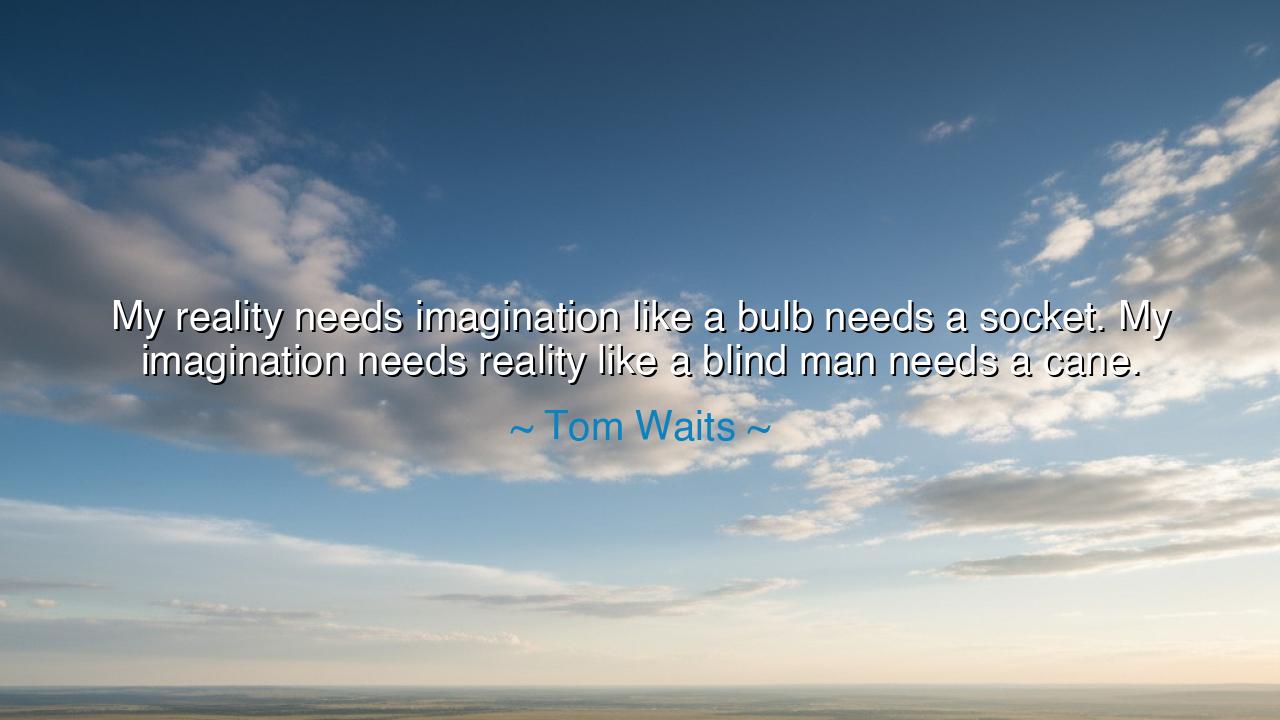
My reality needs imagination like a bulb needs a socket. My
My reality needs imagination like a bulb needs a socket. My imagination needs reality like a blind man needs a cane.






“My reality needs imagination like a bulb needs a socket. My imagination needs reality like a blind man needs a cane.” Thus spoke Tom Waits, the gravel-voiced poet of the human soul, whose words dance in the twilight between dream and dirt, between the sacred and the profane. In this paradoxical saying, Waits reveals a truth older than language itself—that reality and imagination are not rivals, but partners in creation. One gives light; the other gives grounding. One burns with inspiration; the other gives it form. Without imagination, the world is gray and unseeing; without reality, imagination wanders lost, a spirit without a body. Together, they form the union that births all meaning, all beauty, and all art.
The origin of this quote lies in Waits’ life as both artist and philosopher—a man who has walked through the smoke of bars and the silence of the stage, who has seen the sacred in the ordinary and the miraculous in the mundane. Waits has always lived at the border where imagination transforms reality, turning the rust and ruin of life into poetry. In his music, the sound of a broken bottle becomes a bell; the face of a stranger becomes a story; a whisper becomes an anthem. He understands that imagination, though it soars, must have a place to land. Like a lightbulb without its socket, it cannot shine. And likewise, reality, without imagination, is dark—filled with facts but empty of meaning.
To the ancients, this dual truth was sacred. Plato taught that imagination was the bridge between the visible and the invisible worlds. The poets of old, the seers and prophets, stood at the crossing point, giving form to the unseen. They understood what Waits expresses in modern tongue: that imagination without the grounding of reality dissolves into madness, while reality without the uplift of imagination becomes despair. Just as the flame must find the wick to burn, so must thought find form, and form find vision. The light of meaning arises only when the two embrace.
Consider the life of Leonardo da Vinci, whose genius embodied this truth. His imagination conceived of flying machines and human flight centuries before they became possible, but his reality—his study of anatomy, geometry, and mechanics—gave those dreams structure. His imagination saw the heavens; his reality built the wings. Each without the other would have been incomplete. Leonardo’s art and inventions were not mere fantasies—they were the light of imagination shining through the socket of reality. And in that harmony, the world witnessed the flowering of the Renaissance, when reason and vision moved as one.
But the balance is delicate. Too much imagination untethered from truth, and we drift into delusion, mistaking fantasy for wisdom. Too much reality without vision, and the world becomes mechanical, joyless, and blind. Waits’ metaphor of the blind man and the cane reminds us that imagination, without the guidance of experience, stumbles in the dark. Yet the opposite is equally perilous: reality without imagination is blindness without a cane—it gropes through life without direction or meaning. It is only when imagination leans upon the firm ground of reality that it finds its path forward, turning the unknown into discovery and despair into hope.
O listener, take this wisdom deeply into your heart: the world you inhabit is shaped not by what is, but by what you can imagine within it. Yet imagination alone will not suffice—you must root your visions in the soil of action, as the seed must root before it flowers. To live well, you must hold both—the dream and the discipline, the vision and the vessel. The artist, the thinker, the builder, the lover—all must learn this sacred equilibrium. For imagination is the lamp that lights the road ahead, and reality is the road that carries you onward.
Therefore, let this be your lesson: do not flee reality, and do not imprison imagination. Let them live together as light and socket, as soul and body, as melody and rhythm. Feed your imagination with wonder, but test its truth upon the ground of life. Let your reality be enriched by vision, for a world without imagination is but a shadow of what it could be. The greatest works of humankind—its art, its justice, its compassion—have all been born from this marriage of dream and earth. So live as Tom Waits teaches: let your imagination illuminate your reality, and let your reality guide your imagination—for only in their union can you light the dark and walk toward the infinite.






AAdministratorAdministrator
Welcome, honored guests. Please leave a comment, we will respond soon